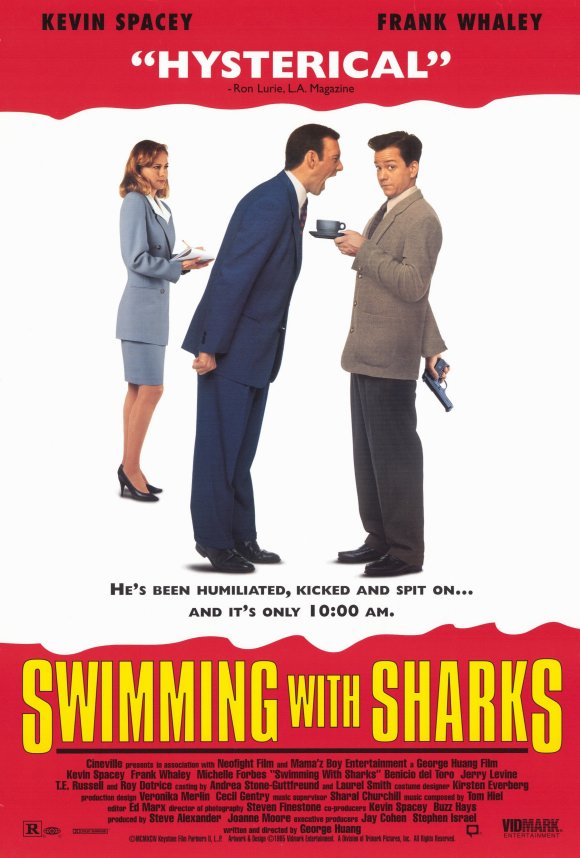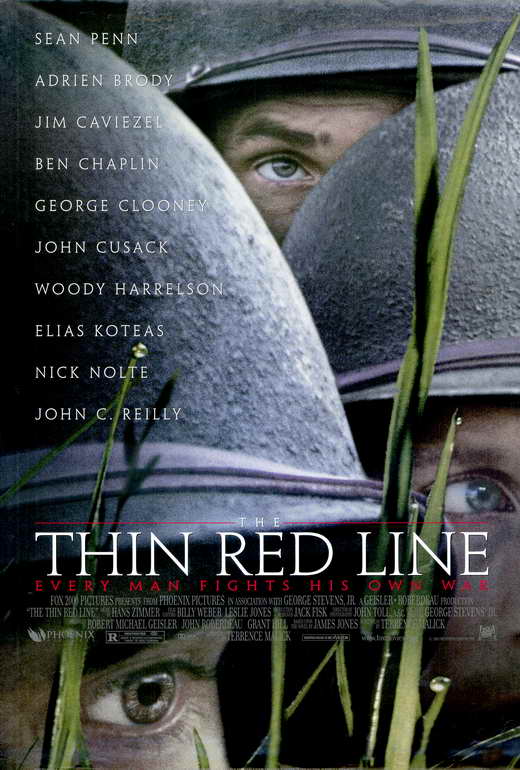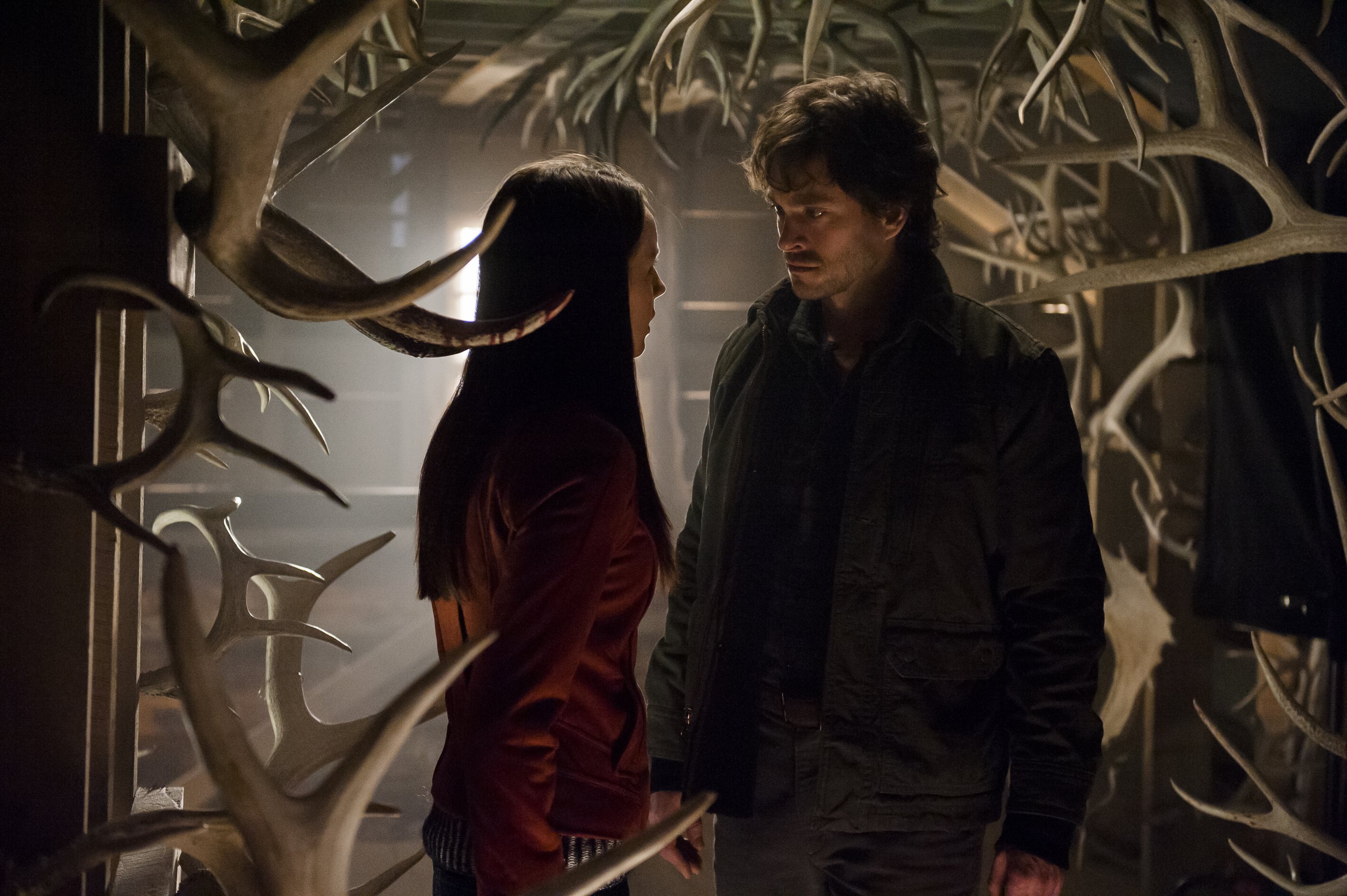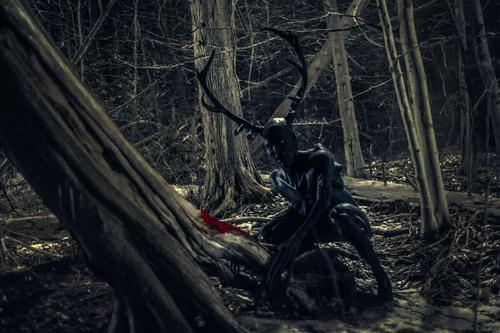This is an experiment. Recently, we decided to put together an "ultimate" list of the best movies of the 90's. This list represents a collaboration between us to determine what was the best of the best of that decade. This list came about in a unique way. Each of us created our on personal top 50 and shared them with each other. 21 of the films picked were on both our lists. Needing 29 more to complete our work, we each selected 15 remaining movies from our own lists and shared them. Then each of us got to choose 3 movies we'd eliminate from the other's 15 and we were given one save to keep one of those three the other tried kick off. Confused? For example - Matt chose 3 movies to kick off from Jay's list and then Jay got to save one of those. Jay did the same for Matt.
Looking at this list ad how it shaped out these is plenty for us both to agree and disagree on. I think its a true melding of our tastes in movies and what makes our site so great. Two different opinions that can be polar opposites at times and then agree totally on others.
This is first list of numbers 50 through 41. We will release 4 more posts to complete the list of 50 in the days to come. The 90's was a great decade for film. Since both of us came of age during this decade many of these movies hold a special place for us. Much of what we learned about film and our appreciation of the medium was born out of this decade. Enjoy!
50. Jerry Maguire (1996)
Directed by Cameron Crowe
Starring Tom Cruise, Cuba Gooding Jr., and Renee Zellweger
Jay: Cameron Crowe really broke through with this crowd-pleaser. Sure, he had some hits with Say Anything and Singles, but this was the first that won raves from critics and audiences alike. Tom Cruise's performance as a sports agent who grows a conscience and pays for it with his job is still one of his best. The love story with his assistant, Dorothy Boyd (Renee Zellweger) is pretty well done. My only complaint is how easily everything is resolved at the end in the last moments of the film. It just seems to happen so quickly and effortlessly. Crow has said that Billy Wilder's The Apartment was a major influence on Jerry Maguire and I can see how it was. Both are pictures about men in morally compromising jobs who ultimately do the right thing despite the damage it does to their careers.
Matt: Crowe wrote this Frank Capra-esque film partially inspired by the failed flop (in the eyes of critics and at the box office) of Crowe's sophomore directorial/written effort, Singles, which had followed Crowe's enormously successful debut Say Anything. This is probably the only romantic comedy type of film you will find on this list, and that is for good reason! It is not only about romance, but of one man's struggle to find and achieve a good "place in the world." It's got the usual Crowe trademarks (i.e., a great soundtrack; the man dressed extremely casual while the woman is formally dressed, and relatable, fun characters), but it also has a true, honest humanity to it that isn't seen in most comedies today. It almost perfectly encapsulates the definition of a true dramedy (drama-comedy).
49. Heavenly Creatures (1994)
Directed by Peter Jackson
Starring Melanie Lynskey and Kate Winslet
Jay: Before he was the powerhouse director of The Lord of the Rings trilogy, Peter Jackson made small-budget horror flicks like Brain Dead (Dead Alive in the U.S.) and Bad Taste. Then, in 1994 he took a big left turn and made this fantastic movie about two young girls, Juliette (Winslet) and Pauline (Lynskey), who develop an obsessive friendship in 1950's New Zealand. Based on true events, Jackson's film follows the two girls as we get welcomed into the fantasy worlds they create in their heads. When their parents try to separate them, Juliette and Pauline hatch a plan that they believe will keep them together forever. Heavenly Creatures, to this day, has one of the most disturbing murders I've ever seen on film. It launched the careers of Jackson and its young star, Kate Winslet, who had never been in a movie prior to this.
Matt: I remember seeing this movie with Jay and the only other thing I had seen of Peter Jackson's before it was his sleeper thriller-dark comedy, The Frighteners. It was the first time I had seen a pre-Titanic Kate Winslet too! I loved that it was based on a true crime which isn't portrayed much in cinema -- that being rather than a male serial killer, the killer turns out to be two teenager with lesbian tendencies killing a mother of one of the two. There are themes of forbidden love, psychiatric hallucination and an unabashed peek into cold-blooded murder. What's even more noteworthy about the film is its conclusion when it is revealed what became of the teens.
48. The Sixth Sense (1999)
Directed by M. Night Shyamalan
Starring Bruce Willis, Haley Joel Osment, Toni Collette and Olivia Williams
Jay: Looking back at Shyamalan's career, it makes it all of the more disappointing that he hasn't matched the success he achieved with this his first major box office hit. The Sixth Sense was one of the those phenomenon's you don't see coming. Similar to The Matrix, it was a worldwide blockbuster that came from nowhere. It was the movie's well-executed plot twist at the end that had most people clapping. Also, the performance by newcomer Haley Joel Osment as young Cole Sear, a troubled boy who claims to see the dead, was a revelation. He received an Oscar nomination along with the equally brilliant Toni Collette who played his mother. At its heart, that's what The Sixth Sense was mostly about for me. The story of a single mother seeing her son for the person he is, and him seeing her as well.
Matt: I know I'm going against the grain here when I say that I've liked Shyamalan's films Unbreakable, Signs, The Village, Lady in the Water, and The Happening. But this one is the best. Before this film, no one had seen such twists and suspense probably since an episode of The Twilight Zone. Nevertheless, The Sixth Sense takes suspense, mystery and drama and masterfully blends them together to execute one of the best thrillers to grace the silver screen in years (let's face it -- the '80s had some wonderful films, but in the genre of suspense thriller mystery, there weren't that many serious good ones!).
47. Princess Mononoke (1997)
Directed by Hayao Miyazaki
Starring (English Version) Billy Crudup, Billy Bob Thornton, Minnie Driver and Claire Danes
Jay: Full disclosure. This is one of the movies Matt tried to remove from the list. I saved it. I'm sure he'll disclose his reasons and for many they may be valid, but, for me, Princess Mononoke is Hayao Miyazaki going all out to try to create the greatest animated epic of all time. Channeling Akira Kurasawa, Miyasaki gives us the story of Ashitaka (Crudup), a young man cursed by a boar spirit, who travels to Tatara, a mining city, looking for the Forest God that can heal him. There, he is embroiled in a war between the leader of the colony, Lady Eboshi (Driver) and the gods of the forest who are resisting the encroaching industrial devastation caused by the humans. It is also a love story, as Ashitaka meets the princess, San (Danes), a girl raised by the wolf spirits determined to kill Eboshi. What I love the most about Princess Mononoke is that, besides its environmental overtones, it presents us with a cast of characters where there is no clear bad guy(s). It doesn't damn the modernization that the humans of Tatara bring with them, it also shows the good that comes from Eboshi's creation, as she uses the wealth she amasses to help the sick and downtrodden. With this movie, Miyazaki would begin the run of films which would make him a more recognizable name in the U.S. and cement his status as one of the greatest animators of all time.
Matt: This was the movie Jay saved from elimination, and I honestly have no idea why. I've only seen Princess Mononoke once ... and that was once too much for me. The animation is great but the story is not nearly as good as Howl's Moving Castle. I'm just glad Spirited Away wasn't eligible. There's just something about most of anime that I can't get into. The English dubbing definitely doesn't help as -- to me -- it doesn't adequately capture or match the emotion going on in the scene and the way the characters are drawn (whether the English voice actor's tone either doesn't match the mood of the scene or doesn't sync with the character's expression). I'd probably have more admiration if the original language was kept and there were subtitles. As for the story, it is entertaining and Miyazaki is a master of his craft, but I did not feel the story warranted a place on this list; it merely wasn't as impressionable to me as the other films on this list.
46. Cop Land (1997)
Directed by James Mangold
Starring Sylvester Stallone, Harvey Keitel, Ray Liotta, Robert De Niro and Robert Patrick
Jay: Now here is a movie that Matt picked that I tried to eliminate. He saved it, so I'll let him explain why it is one of the best movies of the 90's. I will say there are a few things I like about this one. First, Sylvester Stallone has only given two performances I think that could remotely be defined as good acting. One of them is in the original Rocky - the second is in Cop Land. His portrayal of the seemingly slow-minded sheriff, Freddy Heflin, is actually pretty good. Also, the final shootout at the end of the movie is pretty well done and gripping. Other then that, I think this is simply an OK movie, not a great one like most of the others on this list.
Matt: Why make this list? How can it not!? This is one of the finest underrated films of the '90s. Stallone stars as small-town New Jersey cop Freddy Heflin, who isn't a big-time New York City cop thanks to a hearing impairment he acquired when he was younger and saved a girl's life. Freddy takes his job seriously but no one takes him seriously ... until a recent hero cop (Michael Rapaport) tries to alert Freddy to his attempted murder by crooked cops, one of which is his uncle. There is a very novel feel to this film's story and the performances are all masterfully executed with a subdued reality that makes you feel like you're watching a true story. One of the best things I liked about this film was the fact that Stallone went against his usual type casting of the "tough action guy" and portrayed a more quiet, gentle giant-likeable loser here. Plus, the cast is all so superb that the dialogue is delivered effortlessly and the emotions are conveyed so honestly and strongly -- even when the scene is quiet.
45. Before Sunrise (1995)
Directed by Richard Linklater
Starring Ethan Hawke and Julie Delpy
Jay: I've written about my affection for the "Before Trilogy" before on this site. Richard Linklater has created something wholly original with three films that explore the complexities of a love story at different stages. This first film in the series showed how Jesse (Hawke) and Celine (Delpy) met, on a train in Austria and on impulse got off in Vienna together after feeling a connection. The rest of the movie chronicles their one night in the city together as they walk the streets and just talk about life, relationships, etc. At the time of its release I was a senior in high school and I felt it spoke directly to the type of intimacy I wanted to feel with someone. Now that I am in my late thirties I see its charm and naivety, which doesn't cheapen the film, it only comes to me from a different perspective. Not many movies change for the viewer as they watch it at different points in their own life. That is the genius of Linklater's love story.
Matt: I really enjoyed this film but the other two in the trilogy I could honestly do without. The entire draw of this film is that it is a film where the two characters have this almost magical bond which centers around the fact that they have this one night together before they go their separate ways. However, director/writer Richard Linklater rips away a small portion of that magic to present them as suddenly having another rendezvous for the sequel, Before Sunset -- this time having an afternoon together. I know Jay liked Sunset best, but I have to say that I could have done without it. I did like the last in the trilogy, Before Midnight, but nonetheless found it a bit unrealistic in the worst way. Yes, it is a film, but if it is supposing to ground itself in truth and "real life," then it should be realistic. In the third film, they talk about things which two people who have been together -- and talk as much as these two do! -- have already usually covered in the first days, weeks, months of marriage; and that leads to a major sense of pretentiousness within the characters. In Sunrise, the relationship is new and the film perfectly captures that magic of first getting to know someone and having that spark. And that's what makes the film so special.
44. Swimming With Sharks (1994)
Directed by George Huang
Starring Kevin Spacey, Frank Whaley and Michelle Forbes
Jay: This is an entertaining film that has certainly been overlooked in the decades since it was released. It was a perfect vehicle for Kevin Spacey, who had yet to become a household name with his star-making turns in movies like Seven and The Usual Suspects. He plays a big-time Hollywood producer, Buddy Ackerman, a boss so horrible that those who work for him cower in fear. When his new assistant, Guy (Whaley), begins a new relationship with producer, Dawn (Forbes), Buddy insinuates himself between them until Guy's anger forces him to take his boss hostage at his home and torture him. This is dark comedy that turns pretty serious by the end. Spacey is brilliant in it, for sure, and it is well written. Matt chose it for this list, and while I don't think it is totally deserving to be on it, I do think it deserves to be discovered by those who have never seen it.
Matt: I think this movie belongs here because of its extreme dark comedy and inclusion of a great story. Sharks was a film that brutally called out the "chip on the shoulder"-attitude which permeated -- and still permeates -- younger generation who feel they're owed something. There is no happy ending to this film as it ends on a rather jaded note -- reflecting the times of gritty, dark themes which were popular in '90s cinema. Spacey proves his acting chops in this film before Seven and The Usual Suspects were even introduced; and Frank Whaley is the perfect everyman/underdog/intimidated schlub -- a fine underrated character actor. The dialogue in the film is as sharp and quick-witted as Spacey's acting, and there is more drama and meaning in the film than most today.
43. Titanic (1997)
Directed by James Cameron
Starring Leonardo DiCaprio, Kate Winslet and Billy Zane
Jay: OK, haters are going to hate. James Cameron's megahit Titanic was chosen by both Matt and I for this list, and despite what you may think about its script or contrived love story, there is no denying that Titanic was like nothing that had graced the screen before. Cameron's depiction of the voyage and sinking of the great ship was meticulously staged and executed. As the ocean engulfed the Titanic and all those souls onboard it, my jaw dropped at the technical wizardry on display and the emotion packed behind it. I'm a sucker for the whole technology vs. nature theme, and here it is on full display as man's boastful proclamations of an "unsinkable ship" are met by ice and water on a freezing April night. It was a towering achievement and cannot be ignored.
Matt: This was a "maybe" pick for me and almost didn't make my list. But I couldn't pick a monumental '90s movie and not acknowledge this one! Like Jay said ... haters gonna hate. But, whether you like this film or not, you can't deny its epic scope. This movie proves -- like the first, original Star Wars, Alien, and other films -- that, sometimes, the most simplest story can still be one of the most notable. While Titanic does not reach the same epic status as those previously-mentioned films, it still attracted billions of people to see what they already knew was going to happen and its emotional impact is nothing to scoff at. The CGI is amazing and ,although I question Cameron's current juggernaut film, this was a film I couldn't help but enjoy watching. It also launched the career of one of the best actors of today: Leonardo DiCaprio.
42. L.A. Confidential (1997)
Directed by Curtis Hanson
Starring Kevin Spacey, Russell Crowe, Guy Pierce and Kim Basinger
Jay: James Ellroy's novel and it's quick-tempo style was adapted perfectly for the screen by Curtis Hanson. Three L.A. cops, all from different backgrounds and personalities converge when a massacre at an all-night coffee shop uncovers corruption within the police system. L.A. Confidential jump-started the careers of Russell Crowe and Guy Pierce, who were not well known before this. It also earned an Oscar for Kim Basinger, who was luminous as the Veronica Lake-lookalike, Lynn Bracken. Hanson's movie gave us a look a different 1950's Los Angeles. A darker place, where people are flawed and capable of horrible things, but even men like these three imperfect cops, can do what's right.
Matt: For someone who loves crime noir and the old fedora-wearing gangsters and cops who inhabit that world, I did not care for this movie all that much. I thought it was good, but it didn't wow me the same it seemed to do to everyone else. The actors are all great -- except Basinger who should NOT have won an Oscar for this; this was probably one of the reasons why I started questioning and not taking award ceremonies seriously! Ellroy is a great writer but I felt the story here was nothing spectacular. Nine years later, in 2006, when Hollywood (Josh Friedman and Brian De Palma) adapted Ellroy's The Black Dahlia into a film, I felt I was watching the exact same two detectives from Confidential -- the tough guy detective (Aaron Eckhart in Dahlia, Crowe in Confidential), and the smart, almost by-the-book hero protagonist (Josh Hartnett in Dahlia, Pierce in Confidential). Because of this, Dahlia failed to impress but I think it speaks volumes of the mundanity of Confidential.
41. Sweet and Lowdown (1999)
Directed by Woody Allen
Starring Sean Penn and Samantha Morton
Jay: It's been a while since I've seen this one. Since it is Matt's pick, I'll let him write more eloquently about it. What do I remember is the amazing performances. Sean Penn stars as a fictional jazz guitarist, Emmet Ray, a dislikable guy who wants to be as famous as Django Renhardt. Samantha Morton was phenomenal as his mute girlfriend, Hattie. The music in this movie was great and you could tell it was Woody Allen's love letter to the jazz guitarists of the earlier parts of the 20th century.
Matt: I know most consider Annie Hall as writer/director Woody Allen's best film, but I really enjoyed Sweet and Lowdown! With this film, Allen goes a different route with relationships and gives the audience a historical look into the 1930s with jazz guitar as a soundtrack and lighthearted-yet-poignant portrayal of love as seen through the eyes of an egotistical musician and an honest, lovable mute girl who sees the good in people. Especially laughable is Ray's admiration-and-flat-out-fear of Django Reinhardt. Sean Penn's Ray is not exactly the most admirable of Allen's characters but his misadventures are exciting and Morton's inclusion makes them all the more endearing. Sweet and Lowdown is one of those movies that is bittersweet, endearing, poignant and comedic in the only way Allen can pull all of it off.



























